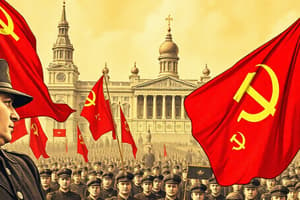Podcast
Questions and Answers
किस घटना ने रूसी साम्राज्य को अंतिम तौर पर अवनामन किया और गहरे परिवर्तन का आरंभ किया?
किस घटना ने रूसी साम्राज्य को अंतिम तौर पर अवनामन किया और गहरे परिवर्तन का आरंभ किया?
किस दो प्रमुख व्यक्तियों ने रूसी क्रांति में महत्वपूर्ण भूमिका निभाई?
किस दो प्रमुख व्यक्तियों ने रूसी क्रांति में महत्वपूर्ण भूमिका निभाई?
क्या कारण थे जो 1917 की फरवरी क्रांति में समाहित होने पर हुई?
क्या कारण थे जो 1917 की फरवरी क्रांति में समाहित होने पर हुई?
किसने 1917 में प्रोवीजनल सरकार पर हमला किया और सोवियत प्रबंध स्थापित किया?
किसने 1917 में प्रोवीजनल सरकार पर हमला किया और सोवियत प्रबंध स्थापित किया?
Signup and view all the answers
कौन सा व्यक्ति बोल्शेविक पार्टी में महत्वपूर्ण व्यक्ति था?
कौन सा व्यक्ति बोल्शेविक पार्टी में महत्वपूर्ण व्यक्ति था?
Signup and view all the answers
रूसी क्रांति के मुख्य प्रभाव के रूप में सभी निम्नलिखित के बीच से कौन-सा उत्पन्न हुआ?
रूसी क्रांति के मुख्य प्रभाव के रूप में सभी निम्नलिखित के बीच से कौन-सा उत्पन्न हुआ?
Signup and view all the answers
किसने सत्ता को समेटने के बाद, संकुचित समूहीन समाज का एकत्रित, केंद्रीकृत रूप में समाज पर अधिपति होने का मार्ग अपनाया?
किसने सत्ता को समेटने के बाद, संकुचित समूहीन समाज का एकत्रित, केंद्रीकृत रूप में समाज पर अधिपति होने का मार्ग अपनाया?
Signup and view all the answers
कौन-सा प्रमुख घटना 1932-1933 में हुई जिसमें बहु-संख्या में हत्याएं और मजबूरी संकलन हुआ, जो मस्स संघर्ष और मृत्यु का कारण बना?
कौन-सा प्रमुख घटना 1932-1933 में हुई जिसमें बहु-संख्या में हत्याएं और मजबूरी संकलन हुआ, जो मस्स संघर्ष और मृत्यु का कारण बना?
Signup and view all the answers
सोवियत संघ से कौन-सी प्रेरित होने वाली संक्रांति हुई?
सोवियत संघ से कौन-सी प्रेरित होने वाली संक्रांति हुई?
Signup and view all the answers
Study Notes
Russian Revolution: Unleashing a Century of Change
The Russian Revolution, spanning two distinct periods from 1917 to 1923, signaled the final collapse of the Russian Empire and ushered in an era of profound transformation. This monumental event, particularly the Bolshevik Revolution, impacted global politics for decades to come. Let's delve into the key players and events that shaped this historical epoch.
The Dual Revolutions
The Russian Revolution unfolded in two phases: the February Revolution and the October Revolution (or Bolshevik Revolution).
During the February Revolution of 1917, a combination of factors, including food shortages, widespread discontent, and political unrest, led to the abdication of Tsar Nicholas II and the formation of a provisional government. The provisional government, however, faced mounting pressure, especially from the left-wing factions of the Russian Social Democratic Labor Party (RSDLP).
The October Revolution in 1917, led by the Bolsheviks (later renamed the Communist Party), was a violent and successful coup that overthrew the provisional government and established Soviet rule. This event marked the beginning of the Soviet era.
The Key Players
The two principal figures in the Russian Revolution were Vladimir Lenin, the founder and leader of the Bolsheviks, and Leon Trotsky, a leading figure in the Bolshevik Party and a top strategist in the October Revolution.
Other notable figures include:
- Alexander Kerensky: A moderate socialist, Kerensky served as the Prime Minister of the provisional government.
- Karl Radek: A Polish-born Marxist revolutionary, Radek was a prominent figure within the Bolshevik Party.
- Anatoly Lunacharsky: An intellectual and public figure, Lunacharsky served as the first Commissar of Enlightenment in the Bolshevik government.
The March to Communism
The Russian Revolution represented a shift towards communism, as the Bolsheviks believed in the establishment of a classless society and the dictatorship of the proletariat, or rule by the working class. One of the most significant consequences of this revolution was the adoption of the New Economic Policy (NEP), which allowed for a certain degree of private enterprise and market-based economic mechanisms.
However, following the death of Lenin, Stalin consolidated power and adopted a more radical, centralized form of communism. His actions resulted in the Great Purge and the Great Famine of 1932-1933, a period of mass executions and forced collectivization that caused widespread suffering and loss of life.
The Legacy of the Russian Revolution
The Russian Revolution had far-reaching effects, shaping global politics and social movements for centuries. The Soviet Union, established in 1922, became a superpower, inspiring other communist revolutions and the Cold War. Conversely, its failure also contributed to the dissolution of the Soviet Union in 1991.
Moreover, the Russian Revolution served as a catalyst for the development of modern social science, including political science, sociology, and economics, as scholars sought to understand and analyze this historical event.
In summary, the Russian Revolution was a complex and transformative period that reshaped the political landscape of the world, leaving a legacy that continues to be studied and debated today.
Studying That Suits You
Use AI to generate personalized quizzes and flashcards to suit your learning preferences.
Description
Test your knowledge on the Russian Revolution, exploring the key players like Vladimir Lenin, Leon Trotsky, and events like the February and October Revolutions. Understand the shift towards communism, the legacy of the revolution, and its impact on global politics.




